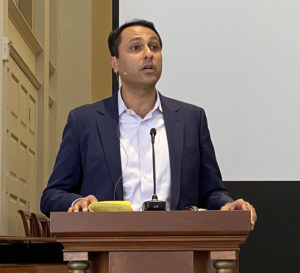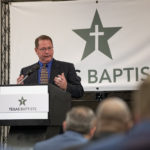DALLAS—Think of interfaith cooperation in the United States like a potluck dinner that benefits from diverse recipes, not a melting pot where distinctiveness is lost, Eboo Patel told students and guests in lectures at Southern Methodist University.
“A potluck is boring if everybody brings the same thing” but richer when everybody contributes and each dish retains its particular flavor, he said.
Patel, author and founding president of Interfaith Youth Core, delivered the Walter B. and Kay. W. Shurden Lectures on Religious Liberty, sponsored by the Baptist Joint Committee for Religious Liberty. The Baptist House of Studies at SMU’s Perkins School of Theology hosted the March 5 lectures, in partnership with the BJC and Faith Commons.
Need for a ‘new narrative’
During a lunchtime dialogue moderated by George Mason, pastor of Wilshire Baptist Church in Dallas, Patel described the current time in American history as a “molten moment” when the nation’s attitudes toward religious pluralism are not yet fully formed and a “new narrative” is needed.
Patel, author of Out of Many Faiths: Religious Diversity & the American Promise, pointed to the 1920s as a period similar in many respects to the present—a time of massive social shifts, income inequality and a resurgence of nativist and racist movements.
In response, the National Conference for Christians and Jews was founded to combat rising anti-Catholic and anti-Semitic sentiments. Particularly in the years leading up to World War II, Protestant ministers, Catholic priests and Jewish rabbis successfully “changed the narrative” regarding the United States, Patel said. Rather than a “white Protestant” country, America came to be seen as a “Judeo-Christian” nation.
“It sends the message: ‘We are a nation that values the contributions of Jews and Catholics and does not violate their dignity,’” he said.
The question for the early 21st century is what kind of narrative will be able to reflect the nation’s increasing diversity and acknowledge the positive contributions of various faith groups, he asserted.
Rooted in religious convictions
Speaking in Perkins Chapel, Patel emphasized the civic framework that ensures religious liberty in the United States had its roots in the deeply held religious convictions of some early European settlers who stood up for the rights of neighbors with different beliefs.
Sign up for our weekly edition and get all our headlines in your inbox on Thursdays

“So many of the things that we care about in our civil society and in our government structures were advanced by people of strong religious and spiritual conviction that benefited people outside their own community,” he said.
Long before the Founders barred the federal government from establishing an official religion, prohibited religious tests for public office and instituted protection for the free exercise of religion, other European settlers stood to defend the religious rights of their neighbors with whom they disagreed, Patel noted.
He cited Roger Williams, who in the mid-1600s envisioned a religiously diverse land where all people—including Jews and “Turks” (Muslims)—could follow the dictates of conscience. Williams—who advocated the separation of church and state—established what became Rhode Island Colony as a refuge for religious dissenters, and he founded the First Baptist Church in America.
Patel also pointed to the Flushing Remonstrance of 1657, in which some citizens of New Amsterdam rejected the governor’s ban on Quaker worship and argued on behalf of religious liberty for all people. Significantly, their motivation for advancing religious liberty for others was the Golden Rule and Jesus’ command to love one’s neighbor as oneself.
“This is not just about the best way to run a government. This is about a religious calling—about what it means for this group of people to be Christian,” Patel noted.
He pointed to Christ’s parable of the Good Samaritan as “a religious call to partnership with those with whom we doctrinally disagree.”
In that story, the priest and Levite—people who followed the “right religion”—passed by a person in need, he noted. But the Samaritan—whom observant Jews believed prayed in the wrong way at the wrong place—acted in the right way, and Jesus said to “go and do likewise.”
“What is the message of this story?” Patel asked. “At least sometimes, you partner with, emulate and follow the person whose doctrine you disagree with.”
‘Roots and wings’
Speaking to several SMU classes in an afternoon lecture, Patel challenged students to use the practical knowledge they have gained from living in a pluralistic society and complement it by learning more about what their peers from varied religious traditions believe.
As they seek to become leaders in interfaith cooperation, students should learn how to engage in dialogue with people from other religious traditions from within the framework of their own spiritual convictions, he stressed.
Patel pointed to the example of Martin Luther King Jr., who built interfaith coalitions to advance civil rights and learned techniques of nonviolent resistance from Mahatma Gandhi but who was motivated by his Christian faith and commitment to following Jesus.
He cited a 1959 Palm Sunday sermon King preached at Dexter Avenue Baptist Church in Montgomery, Ala., in which he praised Gandhi for his Christ-like character, and then closed by inviting individuals in his audience to accept Jesus Christ as Lord and Savior.
“You can have both roots and wings,” Patel said.














We seek to connect God’s story and God’s people around the world. To learn more about God’s story, click here.
Send comments and feedback to Eric Black, our editor. For comments to be published, please specify “letter to the editor.” Maximum length for publication is 300 words.